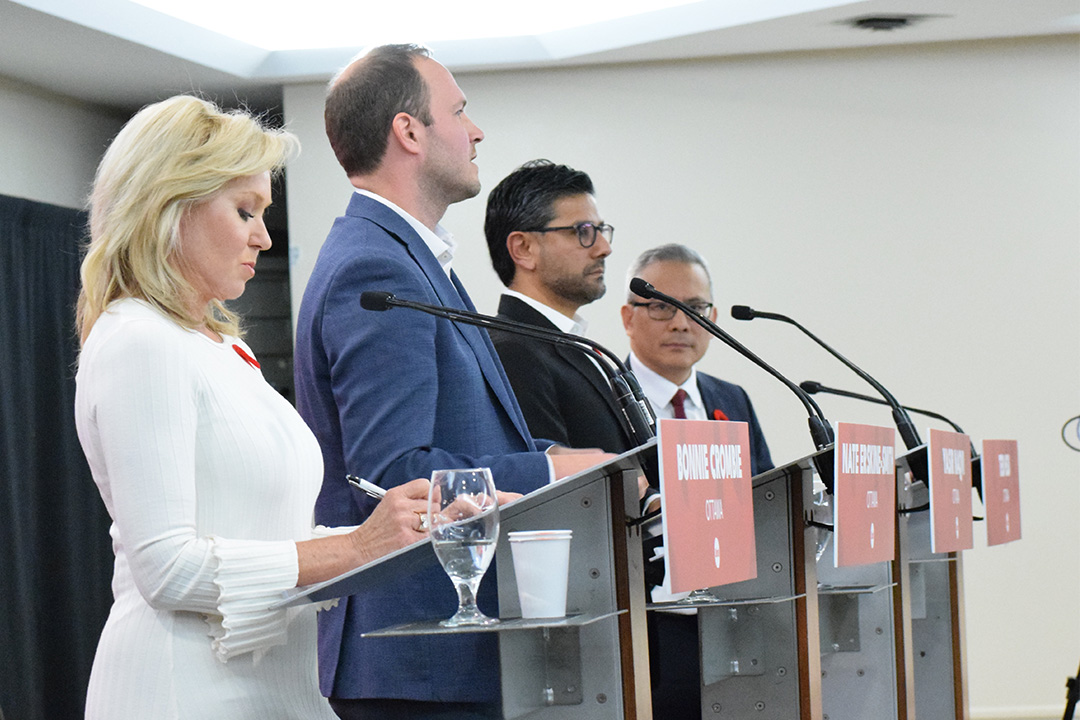The four members vying to be the Ontario Liberal Party’s new leader faced off at Algonquin College on Nov. 8 in their fourth official debate, three weeks before party members vote.
Over the two-hour debate in the D-building, candidates discussed electability, francophone public services, Ottawa’s LRT and the “freedom convoy.”
They also discussed the need to give the party a new life.
Despite the party’s struggles, four candidates want to lead the charge and revive the party: Bonnie Crombie, the mayor of Mississauga, Nathaniel Erskine-Smith, MP for Beaches-East York, Yasir Naqvi, MP for Ottawa Centre, and Ted Hsu, MPP for Kingston and the Islands.
On one fateful election day in 2018, the Ontario Liberal Party went from holding 55 seats in the legislature down to just seven. The provincial election in 2022 wasn’t so kind to the party either, only gaining one seat.
“There’s a spark back in our party,” said Crombie during the debate at the college.
“We need to be back at the grassroots level and we need to energize voters and inspire them.”
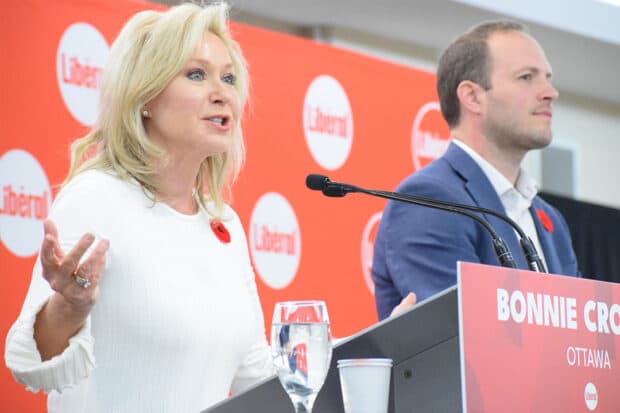
Among other attendees, John Fraser, the Ontario Liberals’ interim leader, was present at the debate with MPPs Mary-Margaret McMahon of Beaches-East York, Karen McCrimmon of Kanata-Carleton and Stephen Blais of Orleans.
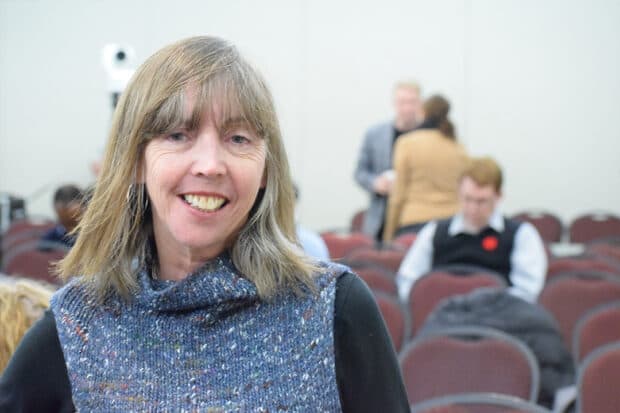
The Algonquin Times had exclusive interviews with each of the leadership candidates.
Here are three issues that could be on the minds of Algonquin College students, along with each candidates’ positions.
Ottawa LRT
Naqvi pointed out flaws in the procurement process and suggested that more time be taken to read the process very carefully and ensure accountability. He also believes that the car-dependent infrastructure Ottawa has grown accustomed to has made the city lose expertise on train development.
“There was a time when Ottawa used to have street cars, and we ripped it all out,” said Naqvi. “Then, there was 30 to 40 years of building more roads and getting more cars on the road…what happened in that period is that we lost expertise.
“I think the province can play a really important role in being the catalyst in orchestrating, building public transit across the province and making sure we get it right,” said Naqvi.
Crombie said the province needs a regional transit authority, which would be a department where experts on train engineering would create the plan for LRT in Ottawa and other cities in Ontario.
Erskine-Smith listed five things that should be expected for good public transit: clean transportation, long-term regional transit planning, making sure the provincial government supports operations and maintenance, making sure housing and transit are well-integrated and getting value for what’s being purchased.
Hsu said he believes the construction of Ottawa’s LRT could be helped by focusing on the project, section by section, rather than having portions built all at once.
“We build the infrastructure step by step,” said Hsu. “You have a crew, they learn how to build it, and they get even better for the next segment.”
“It also applies to the suppliers. If they know they’re going to get steady business for years and years, they will invest in improvements in efficiency.”
He also thinks that keeping Premier Doug Ford’s current policy towards LRT as a second-best plan is wise to do as it would be a waste of money to entirely scrap it.
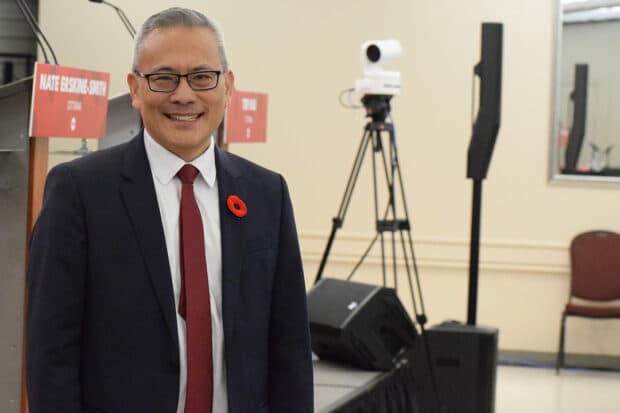
OSAP Interest Rates
The interest rates for Ontario Student Assistance Program (OSAP) loans climbed from 4.7 per cent in 2018 to 7.95 per cent in 2023, according to the CBC.
The Times asked candidates how they plan to help students with this surmounting amount of debt.
Naqvi’s education policy includes scrapping interest rates on OSAP entirely and not obligating students who make less than $50,000 per year to pay the loans back until they have more. Moving forward, he said he’d work towards bringing free tuition to students who make less than $90,000 per year.
Erskine-Smith wants to make tuition free for low-income students. He’d also like to restore grants for middle-income students and promote more flexible repayment plans for those with lower incomes.
Crombie wants to increase grants through OSAP and to increase the amount of time a student has to pay back the loans based on their income.
Hsu said he likes the federal government’s program where payment amount depends on one’s ability to pay. So, those with higher income pay back more in loans, while those with lower income pay much less.
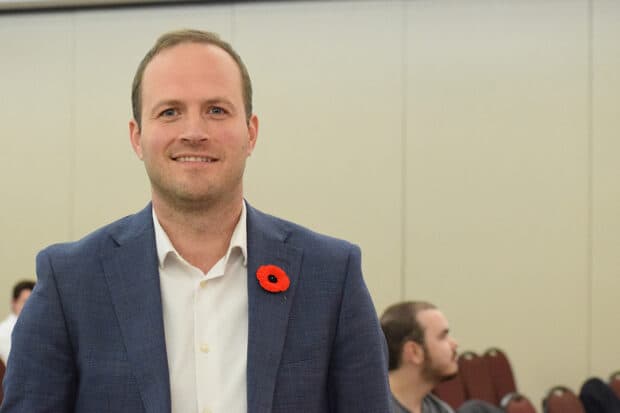
Student Housing
The Times also asked each candidate how they plan to address the current student housing shortage.
Naqvi said the provincial government needs to partner with colleges and universities to build more student housing, look at provincial land as potential spots for developing them and to redesign empty commercial and office buildings into housing.
Crombie referred to the current Progressive Conservative government’s cut of $1,200 per student to the sector and a sharp rise in costs for international students staying in Canada. To fix this, she said her government would invest more in public housing.
The Times reached out to the Progressive Conservative Party of Ontario’s office for comment, but didn’t hear back by deadline.
Erskine-Smith said there needs to be significant baseline funding for colleges and universities to run their operations better. He also would like to see more collaboration between the federal and provincial governments to develop student housing on college land. Outside of it, though, he believes there should be less government involvement in housing developments.
“We need to make sure governments get out of the way to make sure we end restrictive zoning, NIMBYism and to remove all barriers,” said Erskine-Smith.
Hsu believes that there should be more dense residential buildings near college campuses and transit hubs. If he were premier, he would want to legislate the right to build more high-density housing and eliminate single-detached zoning to encourage four-plexes, townhouses and mixed neighbourhoods.


